Organisational Behaviour Report for Ocado: Analysis
VerifiedAdded on 2023/01/10
|17
|5261
|94
Report
AI Summary
This report provides a comprehensive analysis of organisational behaviour within Ocado, a leading online supermarket. It examines how organisational culture, power dynamics, and politics influence individual and team behaviour and performance, utilising Handy's model to categorize Ocado's culture and the French and Raven model to analyze its power structures. The report evaluates content and process theories of motivation, including ERG theory and Adam's Equity theory, and assesses their application in achieving organisational goals. It further explores the characteristics of effective and ineffective teams and applies concepts of OB within a business context. The report critically analyzes the interplay of culture, power, and motivation, offering recommendations for enhancing team and organisational success.
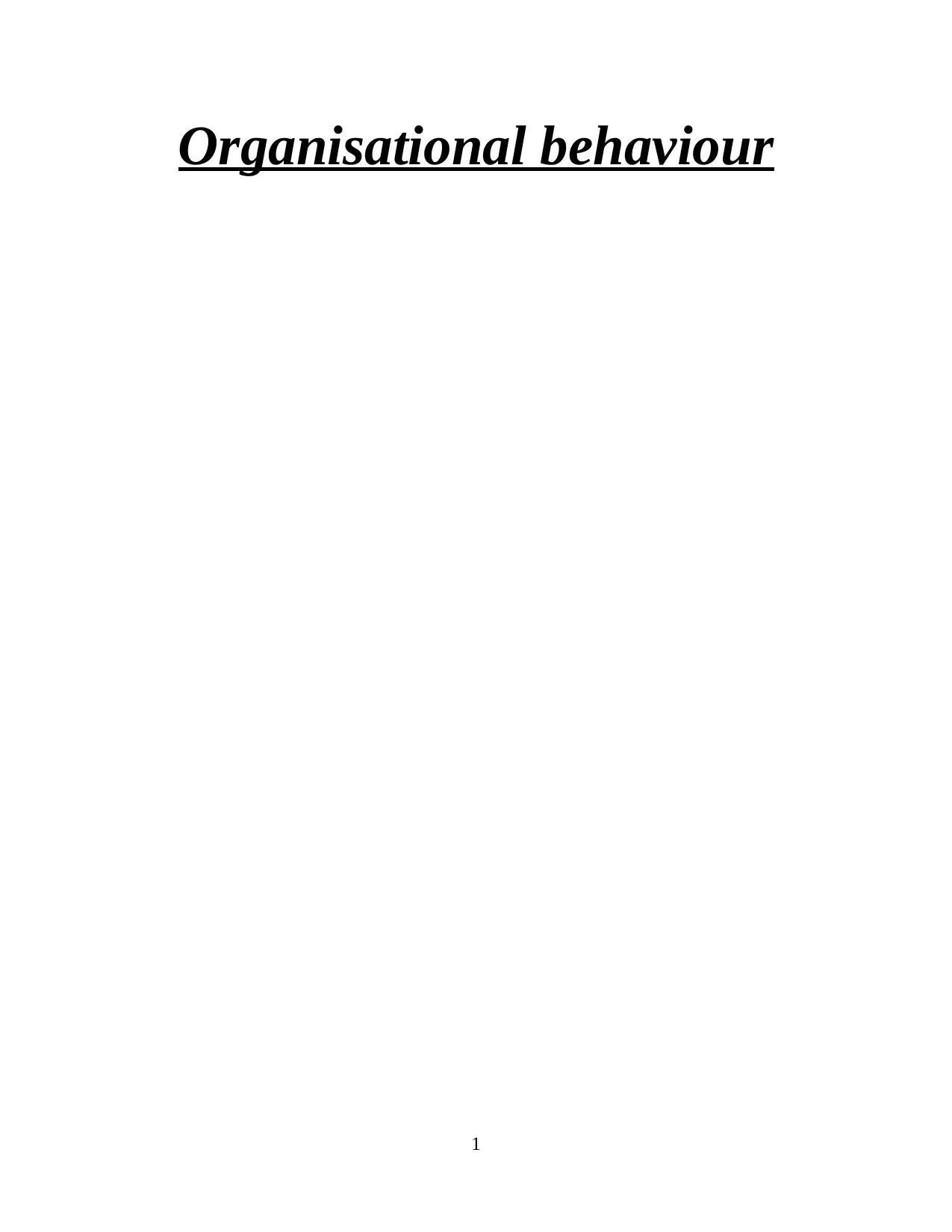
Organisational behaviour
1
1
Paraphrase This Document
Need a fresh take? Get an instant paraphrase of this document with our AI Paraphraser
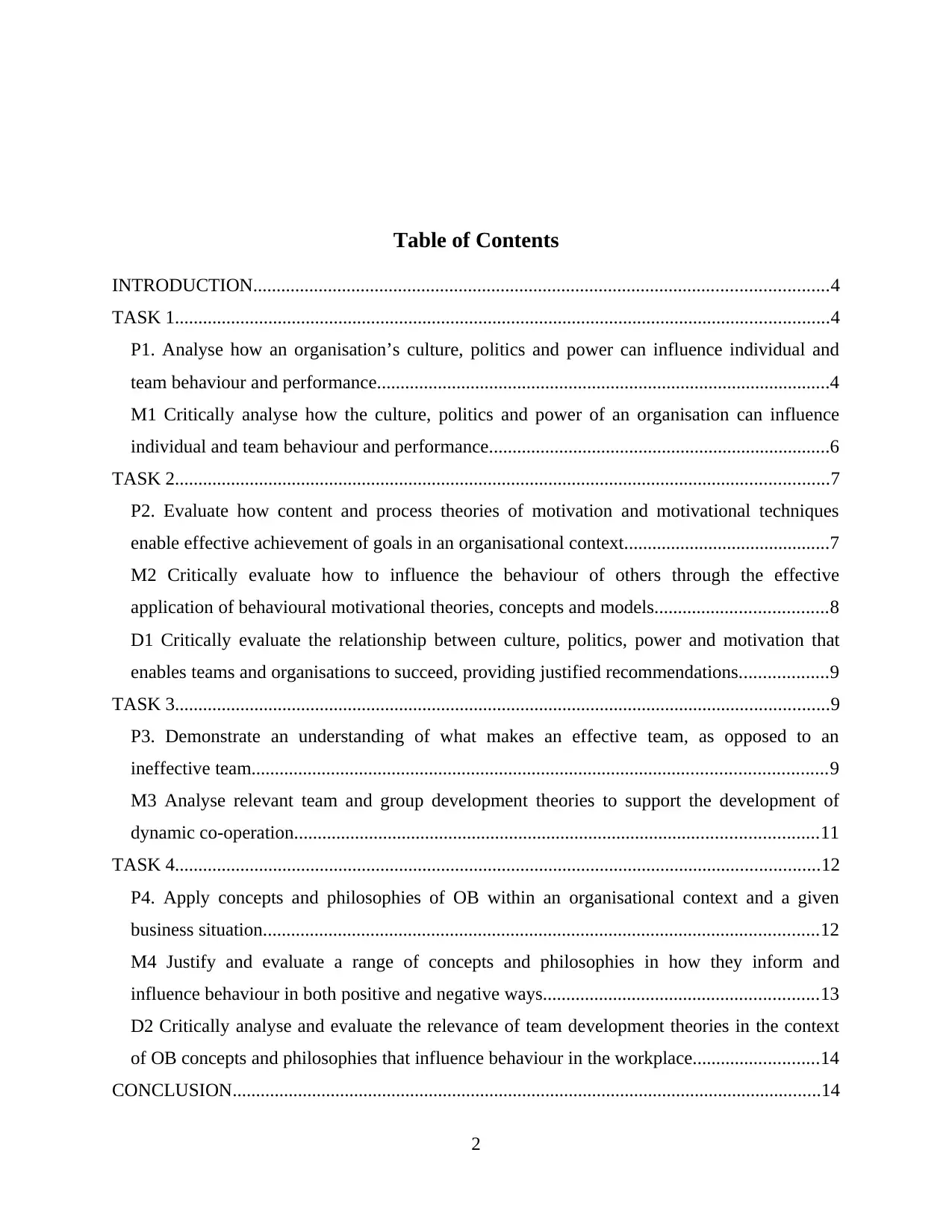
Table of Contents
INTRODUCTION...........................................................................................................................4
TASK 1............................................................................................................................................4
P1. Analyse how an organisation’s culture, politics and power can influence individual and
team behaviour and performance.................................................................................................4
M1 Critically analyse how the culture, politics and power of an organisation can influence
individual and team behaviour and performance.........................................................................6
TASK 2............................................................................................................................................7
P2. Evaluate how content and process theories of motivation and motivational techniques
enable effective achievement of goals in an organisational context............................................7
M2 Critically evaluate how to influence the behaviour of others through the effective
application of behavioural motivational theories, concepts and models.....................................8
D1 Critically evaluate the relationship between culture, politics, power and motivation that
enables teams and organisations to succeed, providing justified recommendations...................9
TASK 3............................................................................................................................................9
P3. Demonstrate an understanding of what makes an effective team, as opposed to an
ineffective team...........................................................................................................................9
M3 Analyse relevant team and group development theories to support the development of
dynamic co-operation................................................................................................................11
TASK 4..........................................................................................................................................12
P4. Apply concepts and philosophies of OB within an organisational context and a given
business situation.......................................................................................................................12
M4 Justify and evaluate a range of concepts and philosophies in how they inform and
influence behaviour in both positive and negative ways...........................................................13
D2 Critically analyse and evaluate the relevance of team development theories in the context
of OB concepts and philosophies that influence behaviour in the workplace...........................14
CONCLUSION..............................................................................................................................14
2
INTRODUCTION...........................................................................................................................4
TASK 1............................................................................................................................................4
P1. Analyse how an organisation’s culture, politics and power can influence individual and
team behaviour and performance.................................................................................................4
M1 Critically analyse how the culture, politics and power of an organisation can influence
individual and team behaviour and performance.........................................................................6
TASK 2............................................................................................................................................7
P2. Evaluate how content and process theories of motivation and motivational techniques
enable effective achievement of goals in an organisational context............................................7
M2 Critically evaluate how to influence the behaviour of others through the effective
application of behavioural motivational theories, concepts and models.....................................8
D1 Critically evaluate the relationship between culture, politics, power and motivation that
enables teams and organisations to succeed, providing justified recommendations...................9
TASK 3............................................................................................................................................9
P3. Demonstrate an understanding of what makes an effective team, as opposed to an
ineffective team...........................................................................................................................9
M3 Analyse relevant team and group development theories to support the development of
dynamic co-operation................................................................................................................11
TASK 4..........................................................................................................................................12
P4. Apply concepts and philosophies of OB within an organisational context and a given
business situation.......................................................................................................................12
M4 Justify and evaluate a range of concepts and philosophies in how they inform and
influence behaviour in both positive and negative ways...........................................................13
D2 Critically analyse and evaluate the relevance of team development theories in the context
of OB concepts and philosophies that influence behaviour in the workplace...........................14
CONCLUSION..............................................................................................................................14
2
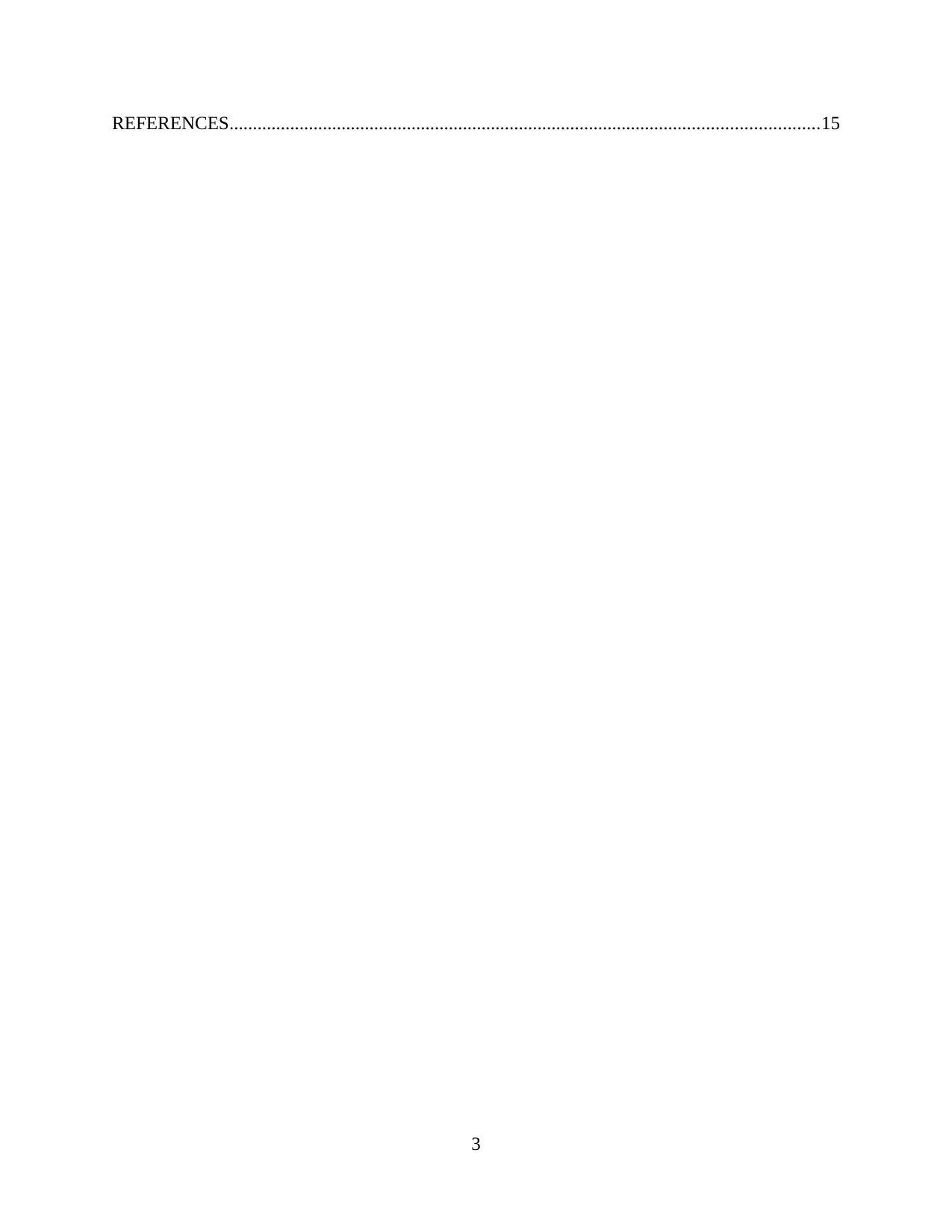
REFERENCES..............................................................................................................................15
3
3
⊘ This is a preview!⊘
Do you want full access?
Subscribe today to unlock all pages.

Trusted by 1+ million students worldwide
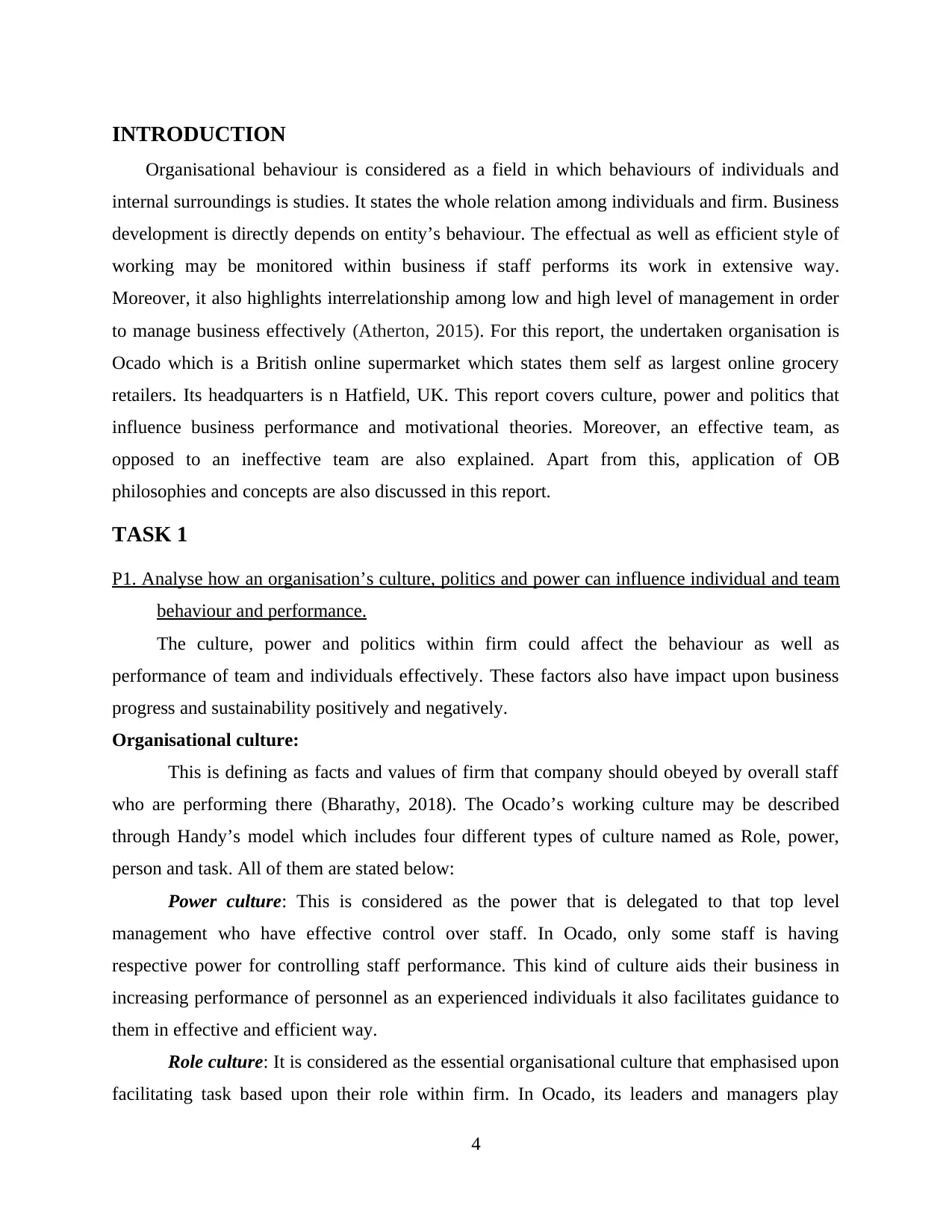
INTRODUCTION
Organisational behaviour is considered as a field in which behaviours of individuals and
internal surroundings is studies. It states the whole relation among individuals and firm. Business
development is directly depends on entity’s behaviour. The effectual as well as efficient style of
working may be monitored within business if staff performs its work in extensive way.
Moreover, it also highlights interrelationship among low and high level of management in order
to manage business effectively (Atherton, 2015). For this report, the undertaken organisation is
Ocado which is a British online supermarket which states them self as largest online grocery
retailers. Its headquarters is n Hatfield, UK. This report covers culture, power and politics that
influence business performance and motivational theories. Moreover, an effective team, as
opposed to an ineffective team are also explained. Apart from this, application of OB
philosophies and concepts are also discussed in this report.
TASK 1
P1. Analyse how an organisation’s culture, politics and power can influence individual and team
behaviour and performance.
The culture, power and politics within firm could affect the behaviour as well as
performance of team and individuals effectively. These factors also have impact upon business
progress and sustainability positively and negatively.
Organisational culture:
This is defining as facts and values of firm that company should obeyed by overall staff
who are performing there (Bharathy, 2018). The Ocado’s working culture may be described
through Handy’s model which includes four different types of culture named as Role, power,
person and task. All of them are stated below:
Power culture: This is considered as the power that is delegated to that top level
management who have effective control over staff. In Ocado, only some staff is having
respective power for controlling staff performance. This kind of culture aids their business in
increasing performance of personnel as an experienced individuals it also facilitates guidance to
them in effective and efficient way.
Role culture: It is considered as the essential organisational culture that emphasised upon
facilitating task based upon their role within firm. In Ocado, its leaders and managers play
4
Organisational behaviour is considered as a field in which behaviours of individuals and
internal surroundings is studies. It states the whole relation among individuals and firm. Business
development is directly depends on entity’s behaviour. The effectual as well as efficient style of
working may be monitored within business if staff performs its work in extensive way.
Moreover, it also highlights interrelationship among low and high level of management in order
to manage business effectively (Atherton, 2015). For this report, the undertaken organisation is
Ocado which is a British online supermarket which states them self as largest online grocery
retailers. Its headquarters is n Hatfield, UK. This report covers culture, power and politics that
influence business performance and motivational theories. Moreover, an effective team, as
opposed to an ineffective team are also explained. Apart from this, application of OB
philosophies and concepts are also discussed in this report.
TASK 1
P1. Analyse how an organisation’s culture, politics and power can influence individual and team
behaviour and performance.
The culture, power and politics within firm could affect the behaviour as well as
performance of team and individuals effectively. These factors also have impact upon business
progress and sustainability positively and negatively.
Organisational culture:
This is defining as facts and values of firm that company should obeyed by overall staff
who are performing there (Bharathy, 2018). The Ocado’s working culture may be described
through Handy’s model which includes four different types of culture named as Role, power,
person and task. All of them are stated below:
Power culture: This is considered as the power that is delegated to that top level
management who have effective control over staff. In Ocado, only some staff is having
respective power for controlling staff performance. This kind of culture aids their business in
increasing performance of personnel as an experienced individuals it also facilitates guidance to
them in effective and efficient way.
Role culture: It is considered as the essential organisational culture that emphasised upon
facilitating task based upon their role within firm. In Ocado, its leaders and managers play
4
Paraphrase This Document
Need a fresh take? Get an instant paraphrase of this document with our AI Paraphraser
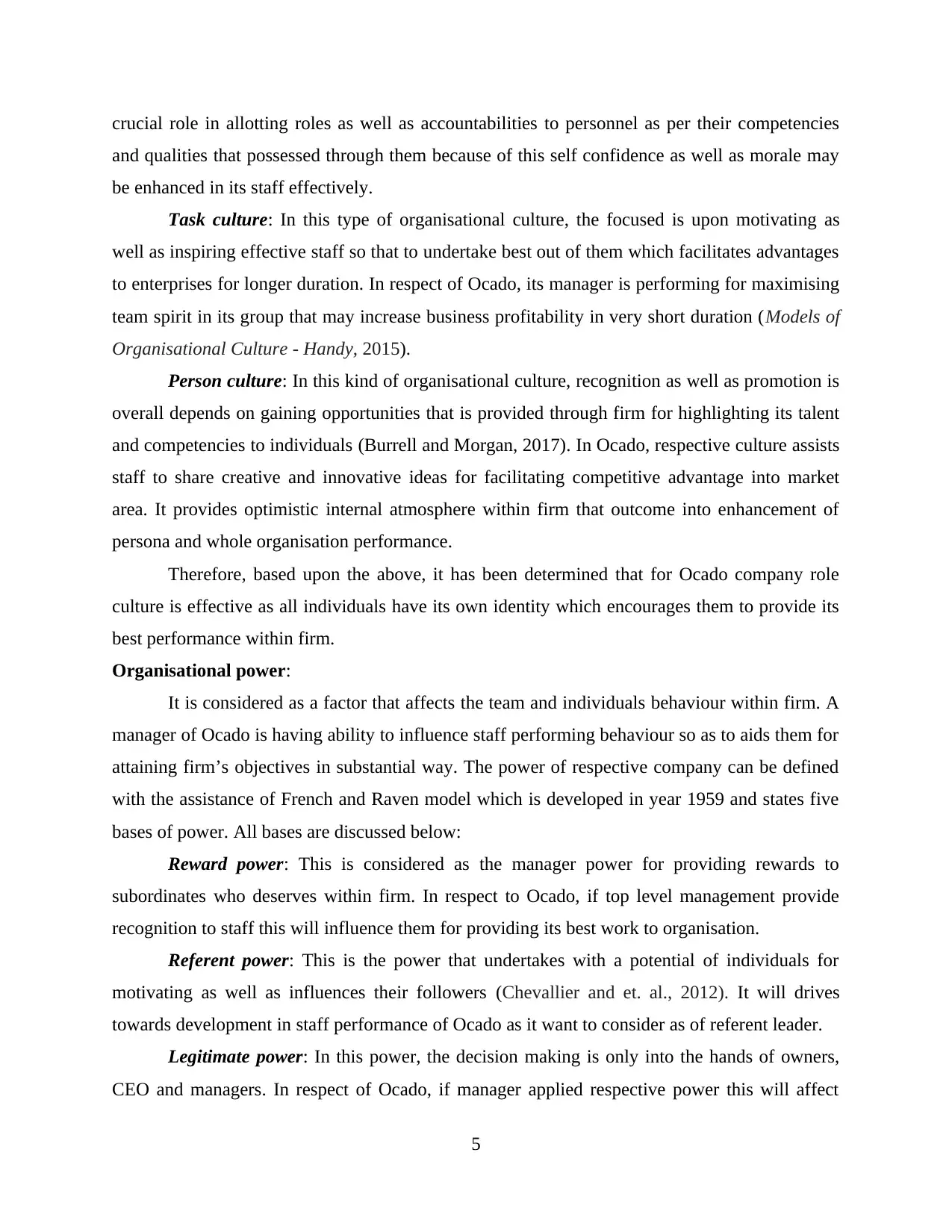
crucial role in allotting roles as well as accountabilities to personnel as per their competencies
and qualities that possessed through them because of this self confidence as well as morale may
be enhanced in its staff effectively.
Task culture: In this type of organisational culture, the focused is upon motivating as
well as inspiring effective staff so that to undertake best out of them which facilitates advantages
to enterprises for longer duration. In respect of Ocado, its manager is performing for maximising
team spirit in its group that may increase business profitability in very short duration (Models of
Organisational Culture - Handy, 2015).
Person culture: In this kind of organisational culture, recognition as well as promotion is
overall depends on gaining opportunities that is provided through firm for highlighting its talent
and competencies to individuals (Burrell and Morgan, 2017). In Ocado, respective culture assists
staff to share creative and innovative ideas for facilitating competitive advantage into market
area. It provides optimistic internal atmosphere within firm that outcome into enhancement of
persona and whole organisation performance.
Therefore, based upon the above, it has been determined that for Ocado company role
culture is effective as all individuals have its own identity which encourages them to provide its
best performance within firm.
Organisational power:
It is considered as a factor that affects the team and individuals behaviour within firm. A
manager of Ocado is having ability to influence staff performing behaviour so as to aids them for
attaining firm’s objectives in substantial way. The power of respective company can be defined
with the assistance of French and Raven model which is developed in year 1959 and states five
bases of power. All bases are discussed below:
Reward power: This is considered as the manager power for providing rewards to
subordinates who deserves within firm. In respect to Ocado, if top level management provide
recognition to staff this will influence them for providing its best work to organisation.
Referent power: This is the power that undertakes with a potential of individuals for
motivating as well as influences their followers (Chevallier and et. al., 2012). It will drives
towards development in staff performance of Ocado as it want to consider as of referent leader.
Legitimate power: In this power, the decision making is only into the hands of owners,
CEO and managers. In respect of Ocado, if manager applied respective power this will affect
5
and qualities that possessed through them because of this self confidence as well as morale may
be enhanced in its staff effectively.
Task culture: In this type of organisational culture, the focused is upon motivating as
well as inspiring effective staff so that to undertake best out of them which facilitates advantages
to enterprises for longer duration. In respect of Ocado, its manager is performing for maximising
team spirit in its group that may increase business profitability in very short duration (Models of
Organisational Culture - Handy, 2015).
Person culture: In this kind of organisational culture, recognition as well as promotion is
overall depends on gaining opportunities that is provided through firm for highlighting its talent
and competencies to individuals (Burrell and Morgan, 2017). In Ocado, respective culture assists
staff to share creative and innovative ideas for facilitating competitive advantage into market
area. It provides optimistic internal atmosphere within firm that outcome into enhancement of
persona and whole organisation performance.
Therefore, based upon the above, it has been determined that for Ocado company role
culture is effective as all individuals have its own identity which encourages them to provide its
best performance within firm.
Organisational power:
It is considered as a factor that affects the team and individuals behaviour within firm. A
manager of Ocado is having ability to influence staff performing behaviour so as to aids them for
attaining firm’s objectives in substantial way. The power of respective company can be defined
with the assistance of French and Raven model which is developed in year 1959 and states five
bases of power. All bases are discussed below:
Reward power: This is considered as the manager power for providing rewards to
subordinates who deserves within firm. In respect to Ocado, if top level management provide
recognition to staff this will influence them for providing its best work to organisation.
Referent power: This is the power that undertakes with a potential of individuals for
motivating as well as influences their followers (Chevallier and et. al., 2012). It will drives
towards development in staff performance of Ocado as it want to consider as of referent leader.
Legitimate power: In this power, the decision making is only into the hands of owners,
CEO and managers. In respect of Ocado, if manager applied respective power this will affect
5
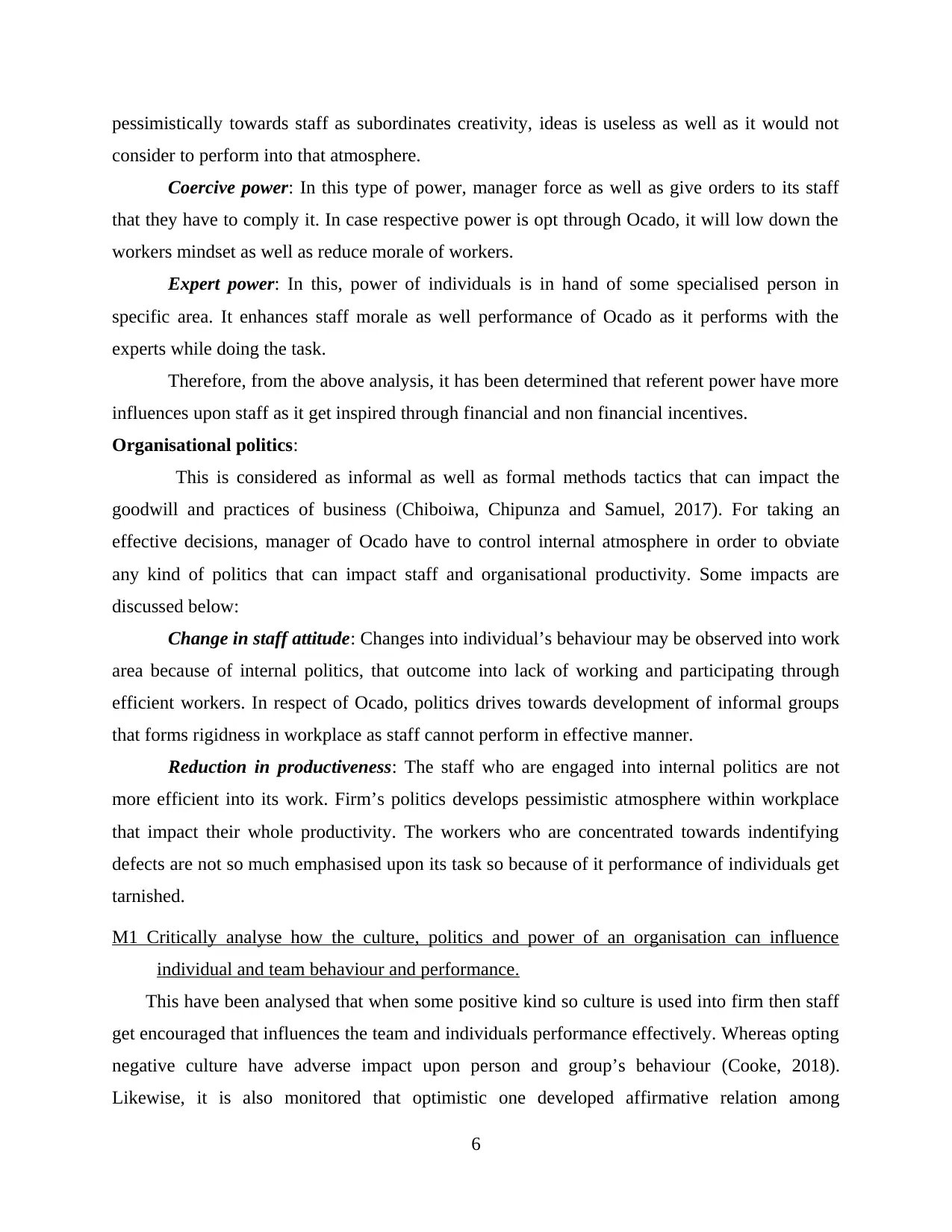
pessimistically towards staff as subordinates creativity, ideas is useless as well as it would not
consider to perform into that atmosphere.
Coercive power: In this type of power, manager force as well as give orders to its staff
that they have to comply it. In case respective power is opt through Ocado, it will low down the
workers mindset as well as reduce morale of workers.
Expert power: In this, power of individuals is in hand of some specialised person in
specific area. It enhances staff morale as well performance of Ocado as it performs with the
experts while doing the task.
Therefore, from the above analysis, it has been determined that referent power have more
influences upon staff as it get inspired through financial and non financial incentives.
Organisational politics:
This is considered as informal as well as formal methods tactics that can impact the
goodwill and practices of business (Chiboiwa, Chipunza and Samuel, 2017). For taking an
effective decisions, manager of Ocado have to control internal atmosphere in order to obviate
any kind of politics that can impact staff and organisational productivity. Some impacts are
discussed below:
Change in staff attitude: Changes into individual’s behaviour may be observed into work
area because of internal politics, that outcome into lack of working and participating through
efficient workers. In respect of Ocado, politics drives towards development of informal groups
that forms rigidness in workplace as staff cannot perform in effective manner.
Reduction in productiveness: The staff who are engaged into internal politics are not
more efficient into its work. Firm’s politics develops pessimistic atmosphere within workplace
that impact their whole productivity. The workers who are concentrated towards indentifying
defects are not so much emphasised upon its task so because of it performance of individuals get
tarnished.
M1 Critically analyse how the culture, politics and power of an organisation can influence
individual and team behaviour and performance.
This have been analysed that when some positive kind so culture is used into firm then staff
get encouraged that influences the team and individuals performance effectively. Whereas opting
negative culture have adverse impact upon person and group’s behaviour (Cooke, 2018).
Likewise, it is also monitored that optimistic one developed affirmative relation among
6
consider to perform into that atmosphere.
Coercive power: In this type of power, manager force as well as give orders to its staff
that they have to comply it. In case respective power is opt through Ocado, it will low down the
workers mindset as well as reduce morale of workers.
Expert power: In this, power of individuals is in hand of some specialised person in
specific area. It enhances staff morale as well performance of Ocado as it performs with the
experts while doing the task.
Therefore, from the above analysis, it has been determined that referent power have more
influences upon staff as it get inspired through financial and non financial incentives.
Organisational politics:
This is considered as informal as well as formal methods tactics that can impact the
goodwill and practices of business (Chiboiwa, Chipunza and Samuel, 2017). For taking an
effective decisions, manager of Ocado have to control internal atmosphere in order to obviate
any kind of politics that can impact staff and organisational productivity. Some impacts are
discussed below:
Change in staff attitude: Changes into individual’s behaviour may be observed into work
area because of internal politics, that outcome into lack of working and participating through
efficient workers. In respect of Ocado, politics drives towards development of informal groups
that forms rigidness in workplace as staff cannot perform in effective manner.
Reduction in productiveness: The staff who are engaged into internal politics are not
more efficient into its work. Firm’s politics develops pessimistic atmosphere within workplace
that impact their whole productivity. The workers who are concentrated towards indentifying
defects are not so much emphasised upon its task so because of it performance of individuals get
tarnished.
M1 Critically analyse how the culture, politics and power of an organisation can influence
individual and team behaviour and performance.
This have been analysed that when some positive kind so culture is used into firm then staff
get encouraged that influences the team and individuals performance effectively. Whereas opting
negative culture have adverse impact upon person and group’s behaviour (Cooke, 2018).
Likewise, it is also monitored that optimistic one developed affirmative relation among
6
⊘ This is a preview!⊘
Do you want full access?
Subscribe today to unlock all pages.

Trusted by 1+ million students worldwide
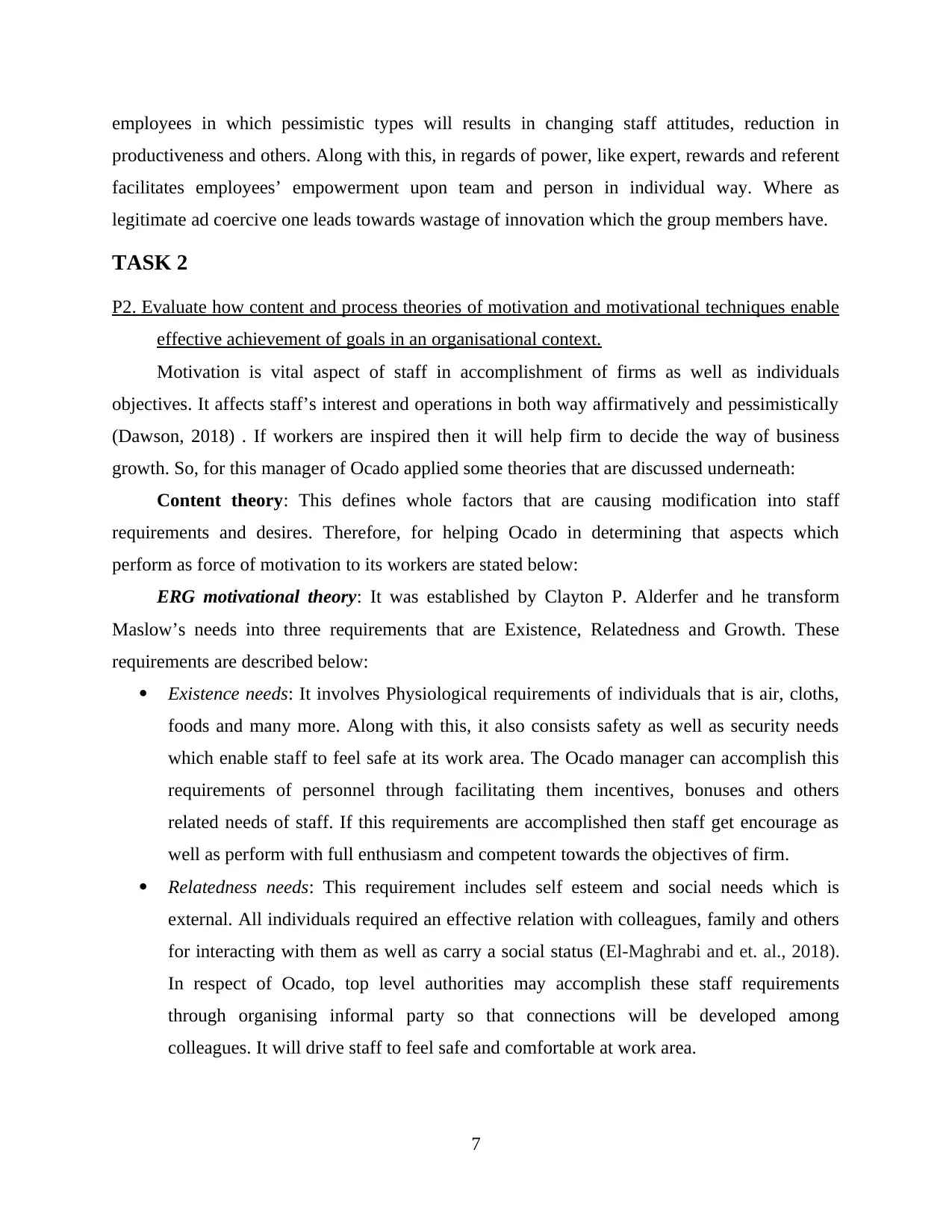
employees in which pessimistic types will results in changing staff attitudes, reduction in
productiveness and others. Along with this, in regards of power, like expert, rewards and referent
facilitates employees’ empowerment upon team and person in individual way. Where as
legitimate ad coercive one leads towards wastage of innovation which the group members have.
TASK 2
P2. Evaluate how content and process theories of motivation and motivational techniques enable
effective achievement of goals in an organisational context.
Motivation is vital aspect of staff in accomplishment of firms as well as individuals
objectives. It affects staff’s interest and operations in both way affirmatively and pessimistically
(Dawson, 2018) . If workers are inspired then it will help firm to decide the way of business
growth. So, for this manager of Ocado applied some theories that are discussed underneath:
Content theory: This defines whole factors that are causing modification into staff
requirements and desires. Therefore, for helping Ocado in determining that aspects which
perform as force of motivation to its workers are stated below:
ERG motivational theory: It was established by Clayton P. Alderfer and he transform
Maslow’s needs into three requirements that are Existence, Relatedness and Growth. These
requirements are described below:
Existence needs: It involves Physiological requirements of individuals that is air, cloths,
foods and many more. Along with this, it also consists safety as well as security needs
which enable staff to feel safe at its work area. The Ocado manager can accomplish this
requirements of personnel through facilitating them incentives, bonuses and others
related needs of staff. If this requirements are accomplished then staff get encourage as
well as perform with full enthusiasm and competent towards the objectives of firm.
Relatedness needs: This requirement includes self esteem and social needs which is
external. All individuals required an effective relation with colleagues, family and others
for interacting with them as well as carry a social status (El-Maghrabi and et. al., 2018).
In respect of Ocado, top level authorities may accomplish these staff requirements
through organising informal party so that connections will be developed among
colleagues. It will drive staff to feel safe and comfortable at work area.
7
productiveness and others. Along with this, in regards of power, like expert, rewards and referent
facilitates employees’ empowerment upon team and person in individual way. Where as
legitimate ad coercive one leads towards wastage of innovation which the group members have.
TASK 2
P2. Evaluate how content and process theories of motivation and motivational techniques enable
effective achievement of goals in an organisational context.
Motivation is vital aspect of staff in accomplishment of firms as well as individuals
objectives. It affects staff’s interest and operations in both way affirmatively and pessimistically
(Dawson, 2018) . If workers are inspired then it will help firm to decide the way of business
growth. So, for this manager of Ocado applied some theories that are discussed underneath:
Content theory: This defines whole factors that are causing modification into staff
requirements and desires. Therefore, for helping Ocado in determining that aspects which
perform as force of motivation to its workers are stated below:
ERG motivational theory: It was established by Clayton P. Alderfer and he transform
Maslow’s needs into three requirements that are Existence, Relatedness and Growth. These
requirements are described below:
Existence needs: It involves Physiological requirements of individuals that is air, cloths,
foods and many more. Along with this, it also consists safety as well as security needs
which enable staff to feel safe at its work area. The Ocado manager can accomplish this
requirements of personnel through facilitating them incentives, bonuses and others
related needs of staff. If this requirements are accomplished then staff get encourage as
well as perform with full enthusiasm and competent towards the objectives of firm.
Relatedness needs: This requirement includes self esteem and social needs which is
external. All individuals required an effective relation with colleagues, family and others
for interacting with them as well as carry a social status (El-Maghrabi and et. al., 2018).
In respect of Ocado, top level authorities may accomplish these staff requirements
through organising informal party so that connections will be developed among
colleagues. It will drive staff to feel safe and comfortable at work area.
7
Paraphrase This Document
Need a fresh take? Get an instant paraphrase of this document with our AI Paraphraser
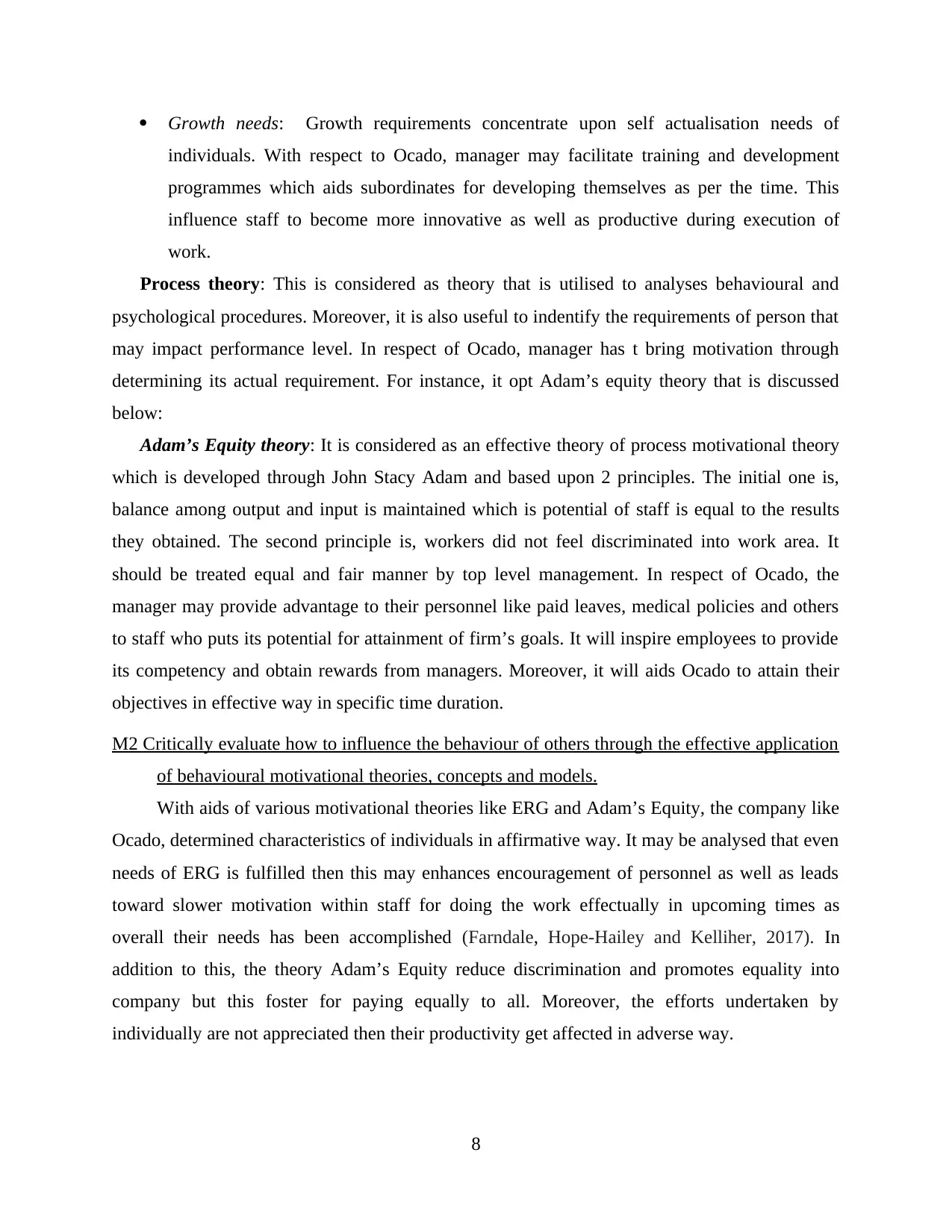
Growth needs: Growth requirements concentrate upon self actualisation needs of
individuals. With respect to Ocado, manager may facilitate training and development
programmes which aids subordinates for developing themselves as per the time. This
influence staff to become more innovative as well as productive during execution of
work.
Process theory: This is considered as theory that is utilised to analyses behavioural and
psychological procedures. Moreover, it is also useful to indentify the requirements of person that
may impact performance level. In respect of Ocado, manager has t bring motivation through
determining its actual requirement. For instance, it opt Adam’s equity theory that is discussed
below:
Adam’s Equity theory: It is considered as an effective theory of process motivational theory
which is developed through John Stacy Adam and based upon 2 principles. The initial one is,
balance among output and input is maintained which is potential of staff is equal to the results
they obtained. The second principle is, workers did not feel discriminated into work area. It
should be treated equal and fair manner by top level management. In respect of Ocado, the
manager may provide advantage to their personnel like paid leaves, medical policies and others
to staff who puts its potential for attainment of firm’s goals. It will inspire employees to provide
its competency and obtain rewards from managers. Moreover, it will aids Ocado to attain their
objectives in effective way in specific time duration.
M2 Critically evaluate how to influence the behaviour of others through the effective application
of behavioural motivational theories, concepts and models.
With aids of various motivational theories like ERG and Adam’s Equity, the company like
Ocado, determined characteristics of individuals in affirmative way. It may be analysed that even
needs of ERG is fulfilled then this may enhances encouragement of personnel as well as leads
toward slower motivation within staff for doing the work effectually in upcoming times as
overall their needs has been accomplished (Farndale, Hope-Hailey and Kelliher, 2017). In
addition to this, the theory Adam’s Equity reduce discrimination and promotes equality into
company but this foster for paying equally to all. Moreover, the efforts undertaken by
individually are not appreciated then their productivity get affected in adverse way.
8
individuals. With respect to Ocado, manager may facilitate training and development
programmes which aids subordinates for developing themselves as per the time. This
influence staff to become more innovative as well as productive during execution of
work.
Process theory: This is considered as theory that is utilised to analyses behavioural and
psychological procedures. Moreover, it is also useful to indentify the requirements of person that
may impact performance level. In respect of Ocado, manager has t bring motivation through
determining its actual requirement. For instance, it opt Adam’s equity theory that is discussed
below:
Adam’s Equity theory: It is considered as an effective theory of process motivational theory
which is developed through John Stacy Adam and based upon 2 principles. The initial one is,
balance among output and input is maintained which is potential of staff is equal to the results
they obtained. The second principle is, workers did not feel discriminated into work area. It
should be treated equal and fair manner by top level management. In respect of Ocado, the
manager may provide advantage to their personnel like paid leaves, medical policies and others
to staff who puts its potential for attainment of firm’s goals. It will inspire employees to provide
its competency and obtain rewards from managers. Moreover, it will aids Ocado to attain their
objectives in effective way in specific time duration.
M2 Critically evaluate how to influence the behaviour of others through the effective application
of behavioural motivational theories, concepts and models.
With aids of various motivational theories like ERG and Adam’s Equity, the company like
Ocado, determined characteristics of individuals in affirmative way. It may be analysed that even
needs of ERG is fulfilled then this may enhances encouragement of personnel as well as leads
toward slower motivation within staff for doing the work effectually in upcoming times as
overall their needs has been accomplished (Farndale, Hope-Hailey and Kelliher, 2017). In
addition to this, the theory Adam’s Equity reduce discrimination and promotes equality into
company but this foster for paying equally to all. Moreover, the efforts undertaken by
individually are not appreciated then their productivity get affected in adverse way.
8
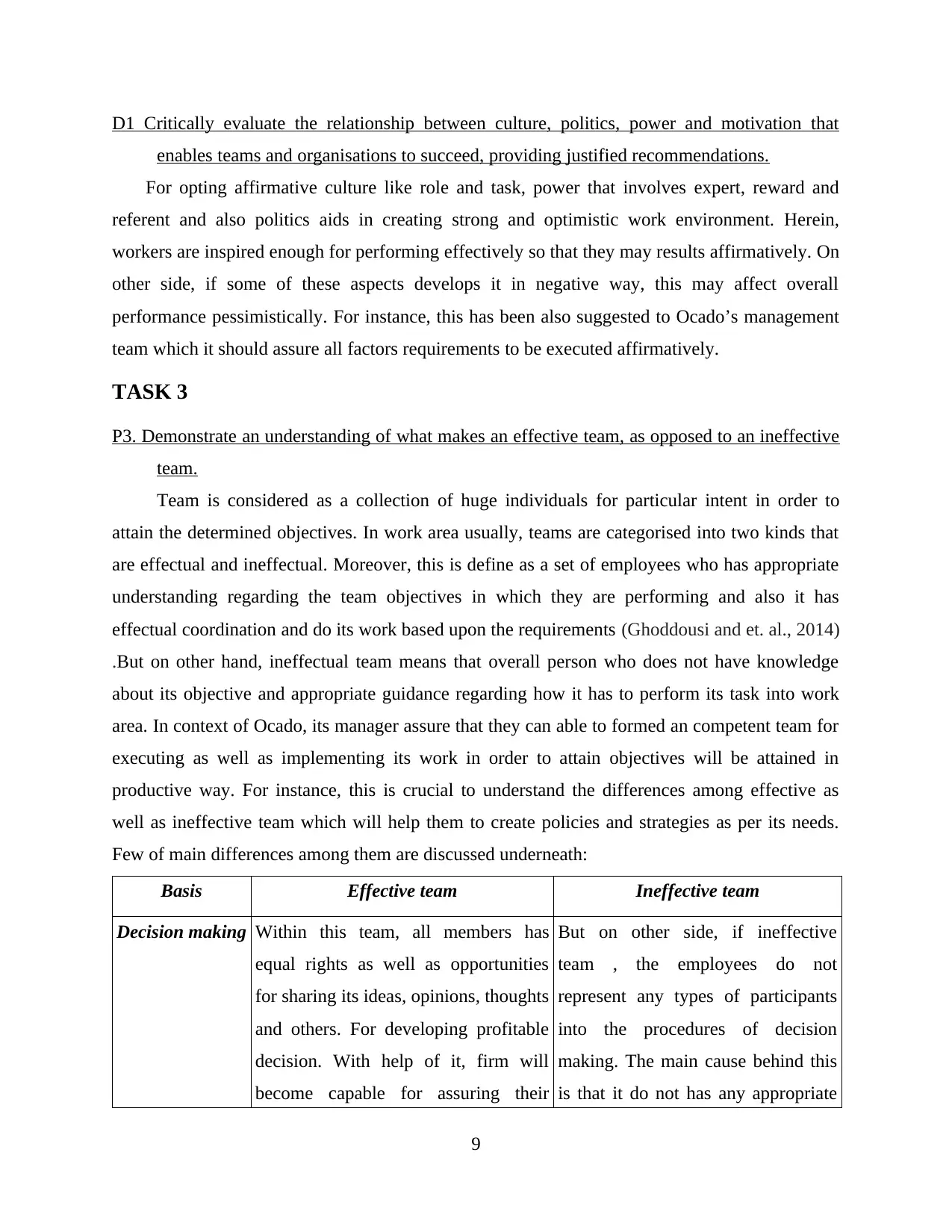
D1 Critically evaluate the relationship between culture, politics, power and motivation that
enables teams and organisations to succeed, providing justified recommendations.
For opting affirmative culture like role and task, power that involves expert, reward and
referent and also politics aids in creating strong and optimistic work environment. Herein,
workers are inspired enough for performing effectively so that they may results affirmatively. On
other side, if some of these aspects develops it in negative way, this may affect overall
performance pessimistically. For instance, this has been also suggested to Ocado’s management
team which it should assure all factors requirements to be executed affirmatively.
TASK 3
P3. Demonstrate an understanding of what makes an effective team, as opposed to an ineffective
team.
Team is considered as a collection of huge individuals for particular intent in order to
attain the determined objectives. In work area usually, teams are categorised into two kinds that
are effectual and ineffectual. Moreover, this is define as a set of employees who has appropriate
understanding regarding the team objectives in which they are performing and also it has
effectual coordination and do its work based upon the requirements (Ghoddousi and et. al., 2014)
.But on other hand, ineffectual team means that overall person who does not have knowledge
about its objective and appropriate guidance regarding how it has to perform its task into work
area. In context of Ocado, its manager assure that they can able to formed an competent team for
executing as well as implementing its work in order to attain objectives will be attained in
productive way. For instance, this is crucial to understand the differences among effective as
well as ineffective team which will help them to create policies and strategies as per its needs.
Few of main differences among them are discussed underneath:
Basis Effective team Ineffective team
Decision making Within this team, all members has
equal rights as well as opportunities
for sharing its ideas, opinions, thoughts
and others. For developing profitable
decision. With help of it, firm will
become capable for assuring their
But on other side, if ineffective
team , the employees do not
represent any types of participants
into the procedures of decision
making. The main cause behind this
is that it do not has any appropriate
9
enables teams and organisations to succeed, providing justified recommendations.
For opting affirmative culture like role and task, power that involves expert, reward and
referent and also politics aids in creating strong and optimistic work environment. Herein,
workers are inspired enough for performing effectively so that they may results affirmatively. On
other side, if some of these aspects develops it in negative way, this may affect overall
performance pessimistically. For instance, this has been also suggested to Ocado’s management
team which it should assure all factors requirements to be executed affirmatively.
TASK 3
P3. Demonstrate an understanding of what makes an effective team, as opposed to an ineffective
team.
Team is considered as a collection of huge individuals for particular intent in order to
attain the determined objectives. In work area usually, teams are categorised into two kinds that
are effectual and ineffectual. Moreover, this is define as a set of employees who has appropriate
understanding regarding the team objectives in which they are performing and also it has
effectual coordination and do its work based upon the requirements (Ghoddousi and et. al., 2014)
.But on other hand, ineffectual team means that overall person who does not have knowledge
about its objective and appropriate guidance regarding how it has to perform its task into work
area. In context of Ocado, its manager assure that they can able to formed an competent team for
executing as well as implementing its work in order to attain objectives will be attained in
productive way. For instance, this is crucial to understand the differences among effective as
well as ineffective team which will help them to create policies and strategies as per its needs.
Few of main differences among them are discussed underneath:
Basis Effective team Ineffective team
Decision making Within this team, all members has
equal rights as well as opportunities
for sharing its ideas, opinions, thoughts
and others. For developing profitable
decision. With help of it, firm will
become capable for assuring their
But on other side, if ineffective
team , the employees do not
represent any types of participants
into the procedures of decision
making. The main cause behind this
is that it do not has any appropriate
9
⊘ This is a preview!⊘
Do you want full access?
Subscribe today to unlock all pages.

Trusted by 1+ million students worldwide
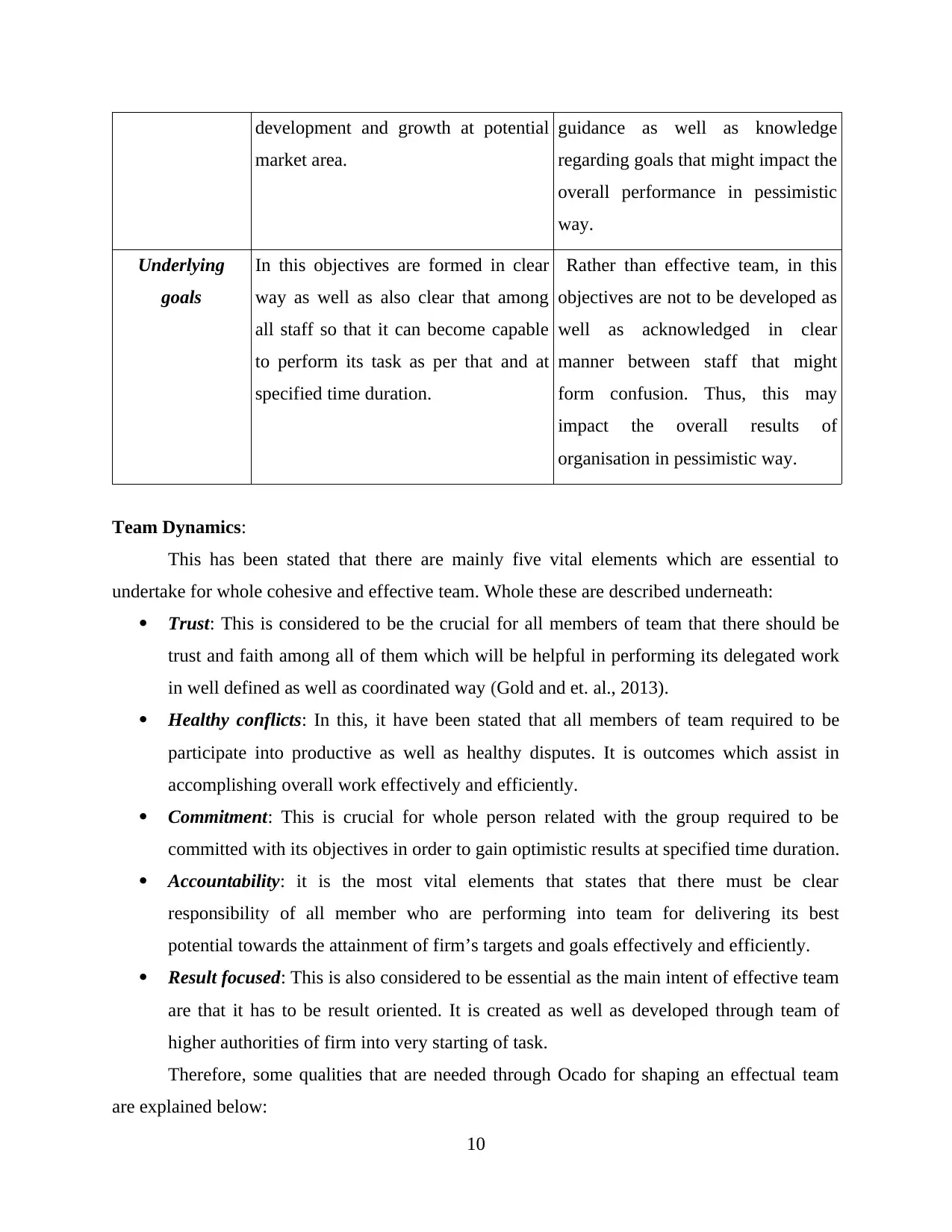
development and growth at potential
market area.
guidance as well as knowledge
regarding goals that might impact the
overall performance in pessimistic
way.
Underlying
goals
In this objectives are formed in clear
way as well as also clear that among
all staff so that it can become capable
to perform its task as per that and at
specified time duration.
Rather than effective team, in this
objectives are not to be developed as
well as acknowledged in clear
manner between staff that might
form confusion. Thus, this may
impact the overall results of
organisation in pessimistic way.
Team Dynamics:
This has been stated that there are mainly five vital elements which are essential to
undertake for whole cohesive and effective team. Whole these are described underneath:
Trust: This is considered to be the crucial for all members of team that there should be
trust and faith among all of them which will be helpful in performing its delegated work
in well defined as well as coordinated way (Gold and et. al., 2013).
Healthy conflicts: In this, it have been stated that all members of team required to be
participate into productive as well as healthy disputes. It is outcomes which assist in
accomplishing overall work effectively and efficiently.
Commitment: This is crucial for whole person related with the group required to be
committed with its objectives in order to gain optimistic results at specified time duration.
Accountability: it is the most vital elements that states that there must be clear
responsibility of all member who are performing into team for delivering its best
potential towards the attainment of firm’s targets and goals effectively and efficiently.
Result focused: This is also considered to be essential as the main intent of effective team
are that it has to be result oriented. It is created as well as developed through team of
higher authorities of firm into very starting of task.
Therefore, some qualities that are needed through Ocado for shaping an effectual team
are explained below:
10
market area.
guidance as well as knowledge
regarding goals that might impact the
overall performance in pessimistic
way.
Underlying
goals
In this objectives are formed in clear
way as well as also clear that among
all staff so that it can become capable
to perform its task as per that and at
specified time duration.
Rather than effective team, in this
objectives are not to be developed as
well as acknowledged in clear
manner between staff that might
form confusion. Thus, this may
impact the overall results of
organisation in pessimistic way.
Team Dynamics:
This has been stated that there are mainly five vital elements which are essential to
undertake for whole cohesive and effective team. Whole these are described underneath:
Trust: This is considered to be the crucial for all members of team that there should be
trust and faith among all of them which will be helpful in performing its delegated work
in well defined as well as coordinated way (Gold and et. al., 2013).
Healthy conflicts: In this, it have been stated that all members of team required to be
participate into productive as well as healthy disputes. It is outcomes which assist in
accomplishing overall work effectively and efficiently.
Commitment: This is crucial for whole person related with the group required to be
committed with its objectives in order to gain optimistic results at specified time duration.
Accountability: it is the most vital elements that states that there must be clear
responsibility of all member who are performing into team for delivering its best
potential towards the attainment of firm’s targets and goals effectively and efficiently.
Result focused: This is also considered to be essential as the main intent of effective team
are that it has to be result oriented. It is created as well as developed through team of
higher authorities of firm into very starting of task.
Therefore, some qualities that are needed through Ocado for shaping an effectual team
are explained below:
10
Paraphrase This Document
Need a fresh take? Get an instant paraphrase of this document with our AI Paraphraser
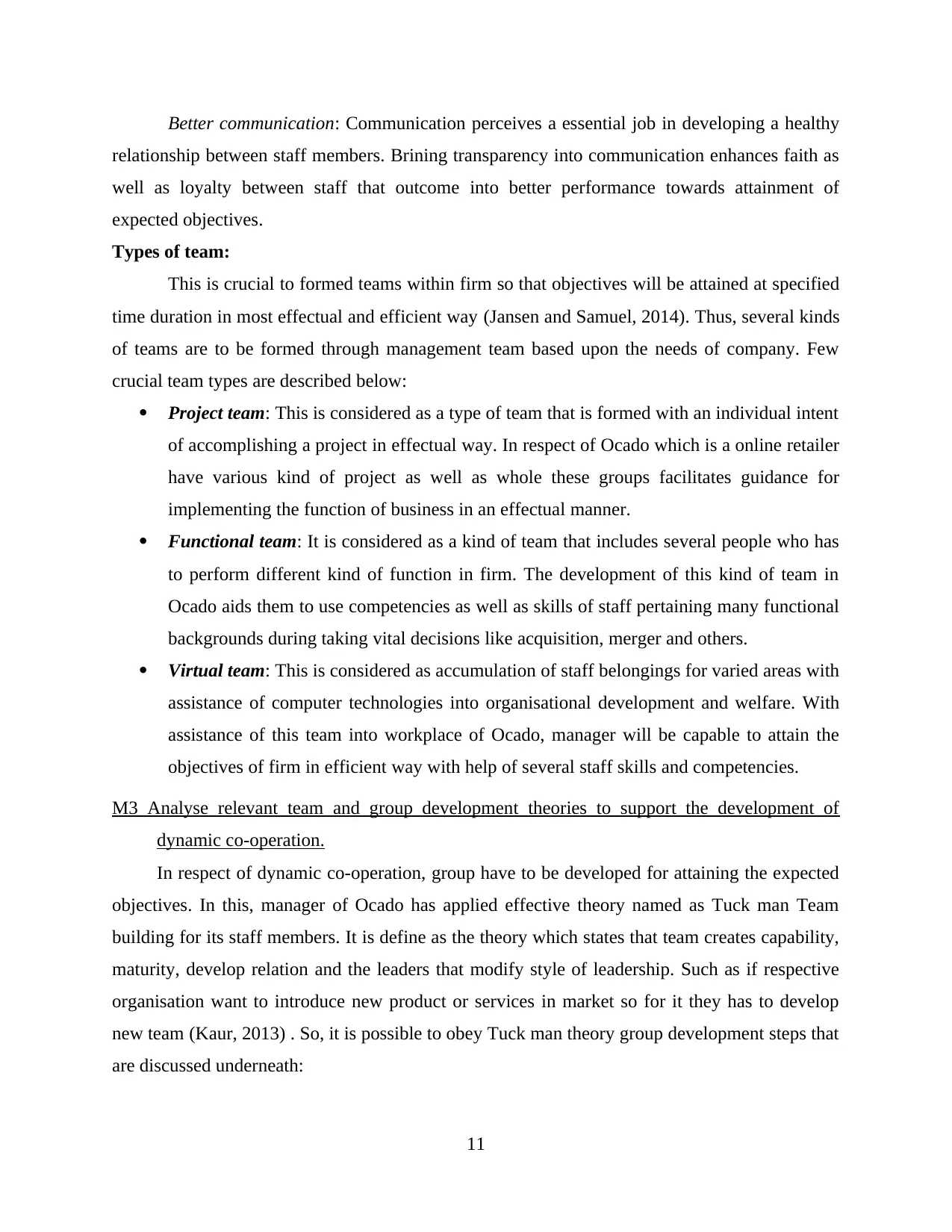
Better communication: Communication perceives a essential job in developing a healthy
relationship between staff members. Brining transparency into communication enhances faith as
well as loyalty between staff that outcome into better performance towards attainment of
expected objectives.
Types of team:
This is crucial to formed teams within firm so that objectives will be attained at specified
time duration in most effectual and efficient way (Jansen and Samuel, 2014). Thus, several kinds
of teams are to be formed through management team based upon the needs of company. Few
crucial team types are described below:
Project team: This is considered as a type of team that is formed with an individual intent
of accomplishing a project in effectual way. In respect of Ocado which is a online retailer
have various kind of project as well as whole these groups facilitates guidance for
implementing the function of business in an effectual manner.
Functional team: It is considered as a kind of team that includes several people who has
to perform different kind of function in firm. The development of this kind of team in
Ocado aids them to use competencies as well as skills of staff pertaining many functional
backgrounds during taking vital decisions like acquisition, merger and others.
Virtual team: This is considered as accumulation of staff belongings for varied areas with
assistance of computer technologies into organisational development and welfare. With
assistance of this team into workplace of Ocado, manager will be capable to attain the
objectives of firm in efficient way with help of several staff skills and competencies.
M3 Analyse relevant team and group development theories to support the development of
dynamic co-operation.
In respect of dynamic co-operation, group have to be developed for attaining the expected
objectives. In this, manager of Ocado has applied effective theory named as Tuck man Team
building for its staff members. It is define as the theory which states that team creates capability,
maturity, develop relation and the leaders that modify style of leadership. Such as if respective
organisation want to introduce new product or services in market so for it they has to develop
new team (Kaur, 2013) . So, it is possible to obey Tuck man theory group development steps that
are discussed underneath:
11
relationship between staff members. Brining transparency into communication enhances faith as
well as loyalty between staff that outcome into better performance towards attainment of
expected objectives.
Types of team:
This is crucial to formed teams within firm so that objectives will be attained at specified
time duration in most effectual and efficient way (Jansen and Samuel, 2014). Thus, several kinds
of teams are to be formed through management team based upon the needs of company. Few
crucial team types are described below:
Project team: This is considered as a type of team that is formed with an individual intent
of accomplishing a project in effectual way. In respect of Ocado which is a online retailer
have various kind of project as well as whole these groups facilitates guidance for
implementing the function of business in an effectual manner.
Functional team: It is considered as a kind of team that includes several people who has
to perform different kind of function in firm. The development of this kind of team in
Ocado aids them to use competencies as well as skills of staff pertaining many functional
backgrounds during taking vital decisions like acquisition, merger and others.
Virtual team: This is considered as accumulation of staff belongings for varied areas with
assistance of computer technologies into organisational development and welfare. With
assistance of this team into workplace of Ocado, manager will be capable to attain the
objectives of firm in efficient way with help of several staff skills and competencies.
M3 Analyse relevant team and group development theories to support the development of
dynamic co-operation.
In respect of dynamic co-operation, group have to be developed for attaining the expected
objectives. In this, manager of Ocado has applied effective theory named as Tuck man Team
building for its staff members. It is define as the theory which states that team creates capability,
maturity, develop relation and the leaders that modify style of leadership. Such as if respective
organisation want to introduce new product or services in market so for it they has to develop
new team (Kaur, 2013) . So, it is possible to obey Tuck man theory group development steps that
are discussed underneath:
11
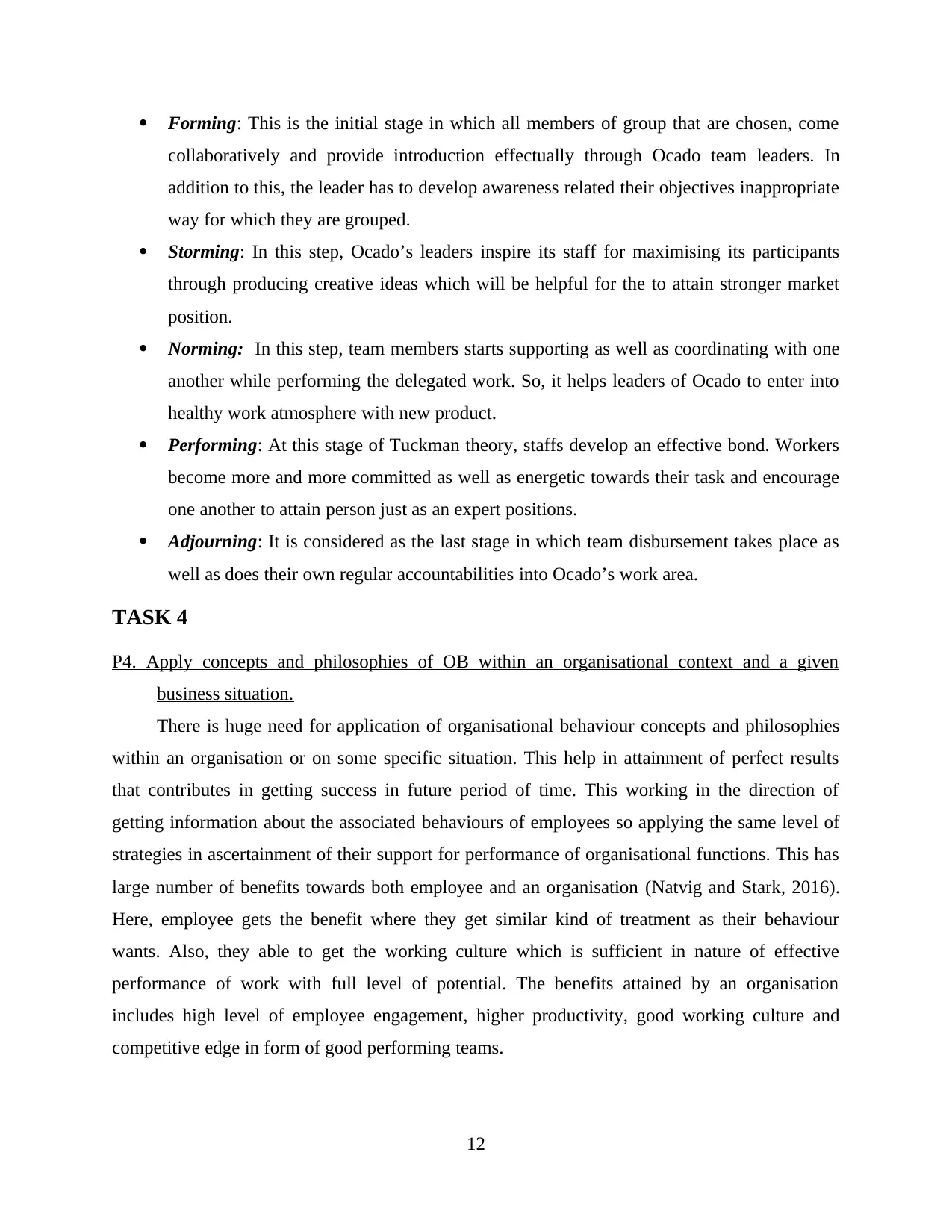
Forming: This is the initial stage in which all members of group that are chosen, come
collaboratively and provide introduction effectually through Ocado team leaders. In
addition to this, the leader has to develop awareness related their objectives inappropriate
way for which they are grouped.
Storming: In this step, Ocado’s leaders inspire its staff for maximising its participants
through producing creative ideas which will be helpful for the to attain stronger market
position.
Norming: In this step, team members starts supporting as well as coordinating with one
another while performing the delegated work. So, it helps leaders of Ocado to enter into
healthy work atmosphere with new product.
Performing: At this stage of Tuckman theory, staffs develop an effective bond. Workers
become more and more committed as well as energetic towards their task and encourage
one another to attain person just as an expert positions.
Adjourning: It is considered as the last stage in which team disbursement takes place as
well as does their own regular accountabilities into Ocado’s work area.
TASK 4
P4. Apply concepts and philosophies of OB within an organisational context and a given
business situation.
There is huge need for application of organisational behaviour concepts and philosophies
within an organisation or on some specific situation. This help in attainment of perfect results
that contributes in getting success in future period of time. This working in the direction of
getting information about the associated behaviours of employees so applying the same level of
strategies in ascertainment of their support for performance of organisational functions. This has
large number of benefits towards both employee and an organisation (Natvig and Stark, 2016).
Here, employee gets the benefit where they get similar kind of treatment as their behaviour
wants. Also, they able to get the working culture which is sufficient in nature of effective
performance of work with full level of potential. The benefits attained by an organisation
includes high level of employee engagement, higher productivity, good working culture and
competitive edge in form of good performing teams.
12
collaboratively and provide introduction effectually through Ocado team leaders. In
addition to this, the leader has to develop awareness related their objectives inappropriate
way for which they are grouped.
Storming: In this step, Ocado’s leaders inspire its staff for maximising its participants
through producing creative ideas which will be helpful for the to attain stronger market
position.
Norming: In this step, team members starts supporting as well as coordinating with one
another while performing the delegated work. So, it helps leaders of Ocado to enter into
healthy work atmosphere with new product.
Performing: At this stage of Tuckman theory, staffs develop an effective bond. Workers
become more and more committed as well as energetic towards their task and encourage
one another to attain person just as an expert positions.
Adjourning: It is considered as the last stage in which team disbursement takes place as
well as does their own regular accountabilities into Ocado’s work area.
TASK 4
P4. Apply concepts and philosophies of OB within an organisational context and a given
business situation.
There is huge need for application of organisational behaviour concepts and philosophies
within an organisation or on some specific situation. This help in attainment of perfect results
that contributes in getting success in future period of time. This working in the direction of
getting information about the associated behaviours of employees so applying the same level of
strategies in ascertainment of their support for performance of organisational functions. This has
large number of benefits towards both employee and an organisation (Natvig and Stark, 2016).
Here, employee gets the benefit where they get similar kind of treatment as their behaviour
wants. Also, they able to get the working culture which is sufficient in nature of effective
performance of work with full level of potential. The benefits attained by an organisation
includes high level of employee engagement, higher productivity, good working culture and
competitive edge in form of good performing teams.
12
⊘ This is a preview!⊘
Do you want full access?
Subscribe today to unlock all pages.

Trusted by 1+ million students worldwide
1 out of 17
Related Documents
Your All-in-One AI-Powered Toolkit for Academic Success.
+13062052269
info@desklib.com
Available 24*7 on WhatsApp / Email
![[object Object]](/_next/static/media/star-bottom.7253800d.svg)
Unlock your academic potential
Copyright © 2020–2026 A2Z Services. All Rights Reserved. Developed and managed by ZUCOL.



